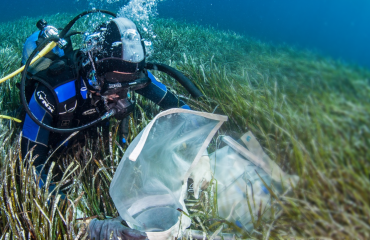Across the entire Mediterranean basin, the sea is changing at an accelerated pace. It is warming faster than the global average, profoundly affecting its biodiversity, fishing dynamics, and traditional ways of life. Every year, marine temperatures break records, causing mass migrations of species, the disappearance of key habitats such as Posidonia meadows, jellyfish blooms, and extreme events that disrupt the ecological balance of the coastline. But this phenomenon, though environmental, has direct human consequences: it is hitting hardest those communities most exposed and with the fewest resources to adapt.
Throughout the Mediterranean, many people live in coastal areas where the sea is the economic and social axis: small towns that rely on artisanal fishing, shellfishing, forms of sustainable tourism, or agriculture near the coast. Rising sea levels and the loss of marine biodiversity are worsening their living conditions. The problem is structural: the most vulnerable people, with less access to decision-making and institutional resources, are those who suffer the greatest losses while seeing political responses delayed or diluted.
This situation is not foreign to what we are experiencing in Spain, and more specifically in Catalonia. Here, the Mediterranean Sea has been for centuries a source of wealth and stability for many communities, but it is now also becoming a space of risk. In regions like the Ebro Delta—one of the most threatened by sea level rise in Europe—the impacts of marine warming, sediment loss, soil salinization, and coastline retreat accumulate. Local communities, many of which rely on fishing, rice cultivation, or family tourism, find themselves in a growing state of precarity in the face of a phenomenon that is advancing faster than legislation and public intervention.
Legally, Spain has had a Climate Change and Energy Transition Law since 2021 which, although it recognizes the importance of adaptation and the protection of the most vulnerable groups, does not specifically or directly address the issue of marine warming. National regulations focus primarily on emissions mitigation and are only beginning to develop responses for coastal climate adaptation. This is further hampered by uneven and often insufficient implementation by the relevant authorities.
In Catalonia, there are relevant regulatory tools such as the Catalan Climate Change Law and the Climate Plan 2021–2030, which acknowledge the impacts of climate change on the coast and highlight the need to protect at-risk communities. However, effective actions are still limited, and citizen participation tools—especially for small fishing or coastal communities—remain weak. The gap between legal frameworks and real solutions is still wide.
At the international level, the United Nations’ recognition in 2022 of the right to a healthy environment can be an opportunity to demand more ambitious and coherent climate policies. Although this recognition is not legally binding, it can serve as a framework to push for clearer regulation linking climate change to the defense of human rights—especially those of vulnerable communities that depend on the sea.
In light of this situation, there is an urgent need to build a stronger, more inclusive, and territory-sensitive legal and political response. Specific adaptation plans must be designed for the most exposed Mediterranean coastal areas, with clear funding, defined timelines, and active participation from affected communities. Those who live by the sea—and who know better than anyone what is happening—must be heard. Traditional livelihoods must be protected, and access to environmental justice mechanisms ensured. Laws must not remain in offices; they must reach the beaches, the ports, the homes.
Marine warming in the Mediterranean is not just a climatic phenomenon: it is also an ethical, social, and legal challenge. If we do not act based on equity, participation, and rights recognition, we risk deepening existing inequalities. A climate transition that does not protect the most vulnerable will not be a just transition. And without climate justice, there will be no sustainable future for our coast, nor for those who inhabit it.
 Català
Català  English
English  Español
Español 
